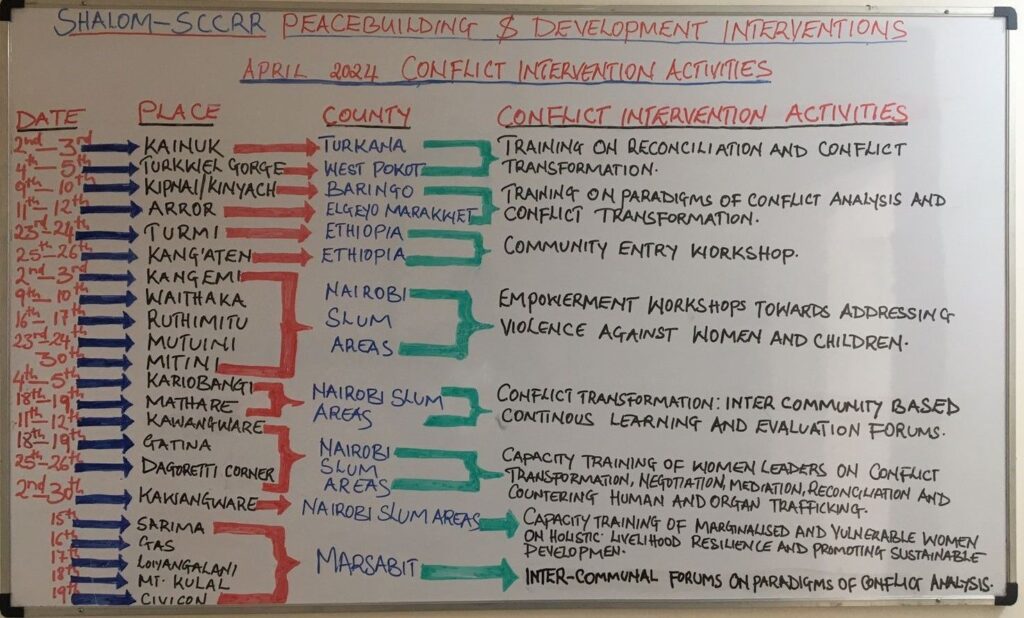By Mary Koech, MA
Throughout 2015, Shalom Center for Conflict Resolution and Reconciliation continued working with communities to educate and transform them into knowledgeable and analytical peace-building activists. Numerous training and follow-up workshops were conducted in the conflict-vulnerable Counties of Nairobi, Nakuru, West-Pokot, Turkana, Marsabit and Samburu. The various trainings revolved around Conflict Prevention, Management, Transformation, Resolution and Reconciliation. Among the target groups were key influential community members – men and women – whose roles are: chiefs, security personnel (including police and Kenya Police reservists-KPR), inter-religious leaders (Muslims and Christians), business persons, teachers, among others.
Numerous peace-building workshops were conducted in Nakuru town and Molo (Nakuru County), Kibera Slums (Nairobi County), Sigor (West Pokot County) and Kainuk (Turkana County) which saw 223 male and 167 female peace-ambassadors trained.
Nakuru and Nairobi County, particularly during the election period, have faced various inter-ethnic based conflicts which have seen the loss of lives and property and even forced Kenyans to be homeless refugees in their own country. Sigor and Kainuk are areas inhabited by the Pokot and Turkana ethnic groups (respectively) and have been in protracted inter-ethnic based conflicts. Violent clashes over scarce resources boundary disputes is just one of the ways that the conflict manifests itself. The areas have also long been marginalized thereby having high poverty rates with communities struggling to meet their basic human needs.
Shalom has strived to increase the involvement of women in workshop attendance as they are the primary source of dependency in the family. In 2014 the number of women trained were 143, and 167 in 2015; an increase of 4.1%

Women Participants after a workshop in Todonyang’, Turkana.
Other workshops focused in the counties of Marsabit and Samburu and had a total of 411 Male and 262 Female. Marsabit County is one of the largest counties in Kenya and borders the country of Ethiopia. The County has in the past faced inter-ethnic conflict where people have been killed, maimed and displaced. Most of the County is hot and dry and consists of poor pastoralists and nomads. Samburu County is in a similar terrain located in the northern-central part of the country and has also had long standing conflict with neighboring communities.
The County faces challenges like cattle raids, increasing road banditry and identity conflicts between the inter-ethnic groups. SCCRR therefore seeks to transform the situation by engaging various key stakeholders in a process where they acquire knowledge and skills for handling the conflict context. The trainings that they have received have focused on Conflict Prevention, Transformation, Resolution and Reconciliation.
The third area of focus was in the remotest parts of Turkana that include Todonyang’, Kibish and Kokuro where a total of 159 male and 147 women were trained in Conflict Prevention, and Management. These areas lie along Ilemi Triangle which is an area claimed by Kenya, Ethiopia and South Sudan. The communities in these areas are the Turkana of Kenya, the Didinga and Toposa of South Sudan and the Nyangatom in both South Sudan and Ethiopia and the Dassanech of Ethiopia. These vulnerable communities are desperate for knowledge on how to address their conflicts peacefully. They have been marginalized for long and are always eager to learn life-long analytical skills that would lead them to sustained reconciliation.

Distribution by gender in locations where Shalom intervened in 2015.
In addition to the vast number of workshops held, were the collaborations between Shalom and The Intergovernmental Authority on Development (IGAD) and SCCRR and Association of Member Episcopal Conferences in Eastern Africa (AMECEA).
The new and improved agreement between SCCRR and IGAD lays out the commitments of both institutions in development and peace-building in the IGAD region. Areas of research, policy making, peace-education programmes and the mobilization of resources for the implementation of regional projects were some of the focus areas of the improved MoU. A major development agreed upon is the intent to have Shalom Conflict Center move into South Sudan to work with the communities in an effort to equip them with analytical skills for sustainable peace-building.
The MoU between SCCRR and AMECEA recognizes the important roles the parties can play in promoting the dignity of life, peace, development and the potential benefits of cooperation. It also ensures a close institutional relationship for information sharing and joint initiatives across various religious institutions.

